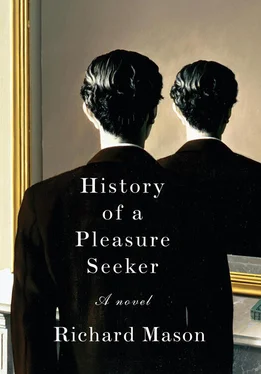They talked for an hour with great amiability and Piet learned that Didier was the son of a Swiss chauffeur at Maarten Vermeulen-Sickerts’ Amstel Hotel; that he had been a page there before Mr. Blok spotted him and promoted him to the house. “He got me a uniform with trousers so tight I could barely breathe when I first came. I had to get my mother to make me a new pair, for modesty’s sake.” Didier related the story of his seduction of Hilde and ended with the declaration that he and Piet should stick together in this swamp of sexual predators. It was a joke, of course, and both men laughed. “Careful!” Didier put his finger to his lips. “You don’t want Blok to know we’re awake or he’ll join us. When I first arrived he used to come into my room, hoping to find me undressed. He’ll do the same to you.”
“Was he ever successful?”
“Once or twice before I learned.”
“What about the other servants?”
“Naomi de Leeuw’s a bitch, but she’s a bloody good housekeeper. This place is run like the best hotel in Europe. The attic floor’s raised so the family doesn’t get woken when one of us lesser mortals goes for a piss in the night. You get the royal treatment too when you’re with them.”
“I’m looking forward to it.”
Didier rose and bowed. “ ‘Bow, eye contact, smile, action, bow.’ ” He caught the housekeeper’s joyless intonation perfectly. “You’ll feel like the czar of bloody Russia. When I do it, remember it’s my Chartreuse we were drinking up here tonight.”
“I’m grateful, believe me.”
“Don’t be. It’s a relief to have someone to talk to. The other tutors were hopeless, the chef never speaks to anyone, and otherwise there’s only Blok.”
“Who’s in charge, him or Mrs. de Leeuw?”
“He’s meant to be, but she really is. Keeps everyone very firmly in line, and if you annoy her she’ll find a way to have you dismissed. She loves Agneta Hemels and for some reason she puts up with Hilde. I think it’s because she knows she can break her completely and rebuild her in her own image.”
This intelligence was useful to Piet, who knew from watching certain undergraduates handle his father that getting on with petty tyrants is the key to a happy life. “What’s the secret to Mrs. de Leeuw?”
“Keep very clean. Be prompt. Don’t put on airs. She doesn’t like it when tutors forget themselves and start behaving as if they aren’t servants too.”
“Cleanliness, punctuality, humility.”
“Exactly. A little hard to do on two baths a week, but you can share my water if you want. In fact”—Didier grinned—“if we share each other’s water we can both bathe every second day.”
The prospect of bathing twice a week had until now seemed to Piet the height of luxe, but he was happy to raise his standards further. “Is there a lot of hot water?”
“Enough for one deep bath a night. Blok has Tuesdays, Fridays and Saturdays. We can split the others. You’ll find a good bath a blessing after a day of tireless servility. It’ll keep you in with Mrs. de Leeuw too.”
“I’m game, then.” Piet smiled. “Tell me about Egbert.”
“You haven’t met him? The strangest little boy I ever knew in my life. He used to drive us mad when he played the piano in this house. Same tune a hundred times over — I don’t exaggerate. And this fear of going outside. It’s not the kind of phobia poor children suffer from.”
“I’m supposed to cure him of all that.”
“Good luck to you. Many have fallen in the attempt.” Didier shared the last of the Chartreuse between them.
“If Louisa never speaks in public, how do you know she and Constance gossip? Surely you don’t listen at doors?”
“Certainly not. That’s the sort of thing you get away with in other houses. Not here.”
“How do you know then?”
“I’ll show you. Come with me, but don’t say a word or you’ll wake Blok.”
Didier opened the door and led Piet out into the darkened corridor. Gert Blok was dozing and heard the floorboards creak. He was instantly wide awake. One of the young men was going to the bathroom. Perhaps he should go too and stumble against him in the dark as if half asleep? But he hesitated too long and a door closed. It was the door to Didier’s room, which was half the size of Piet’s and much more plainly furnished.
Didier drew Piet towards the window. “Louisa’s bedroom’s just beneath mine. She smokes on her balcony because her parents wouldn’t approve. When the door’s open you can hear every word she and Constance are saying. That’s how I know she’s an atheist.” He put his arm around Piet’s shoulders. “They’re probably talking about you tonight. Are you man enough to listen?”
The temptation to know precisely the impression he had made on two girls he so badly wished to charm was irresistible. Piet opened the window as quietly as possible. It was a narrow window and in order to get through it he had to lean across Didier, his shoulder resting against his new friend’s back. They listened. The lights in the room below were on and they caught Constance in midsentence. “… most beautiful hands I’ve ever seen. And his manners are a vast improvement on the last one’s.”
“He’s not as handsome as all that.” Louisa spoke in the same noncommittal tone she had used to Piet at dinner. “His mouth’s too big for his face and there’s something odd about his nose. We’re just starved of men, sweet Constance. Our standards are slipping by the hour. Besides—”
But now she moved away, and the words were lost.
“She’s unforgiving with everyone,” whispered Didier, breathing warm, mint-scented breath against Piet’s cheek.
The girls came back to the window. Both were laughing; but then Louisa said, in a much more serious voice: “There’s something fishy about this Mr. Barol, Constance. Something false. You can see he has an astoundingly high opinion of himself.”
“Well so do I, of myself,” said Constance.
“Yes, but you’re more straightforward than he is. I don’t trust him. As I said: he’s fishy.”
It was a terrible end to a day of otherwise unblemished triumph for Piet. He pulled back into the room and smiled to suggest that he took all this in his stride. In fact he was deeply wounded.
“Don’t worry.” Didier squeezed his shoulder. “There’s something fishy about me too.”
Egbert Vermeulen-Sickerts woke the next morning a little after four o’clock while even Hilde Wilken — whose job it was to prepare the family’s breakfast trays — was still fast asleep. He was a small child, with a high red complexion and very pale blond hair. The night before, lured by the sounds of merriment and music coming from the drawing room, he had forgotten the sore throat he had spent all day complaining of and crept to its open door. Through the hinges he had seen the man who was to be his new tutor. He was desperate not to embarrass himself before such an enviable figure.
He sat up and put his right foot onto the carpet, then his left, then he withdrew them both and repeated the procedure six times. He went into his little bathroom and ran an ice-cold bath, which he submerged himself in seven times. He brushed his teeth seven times, until the iron taste of blood filled his mouth, then, aware of passing time, he got dressed. By a great effort of will — the kind only the fear of shame can inspire — he disobeyed the impulse to get undressed and dressed again a further six times. Spurred by this small but meaningful achievement, he opened his bedroom door.
The house was silent and dark. He preferred to move through it unobserved, in case he should make an error that required correction. This morning he was unusually alert and made no mistakes. He went down the stairs, treading with equal weight on a blessedly even number of red steps. The marble floor of his own entrance hall, with its chaotic darts of black on gray, could be a violent sea; but this morning it was calm and he crossed it with ease. He went through the dining room and opened the door cut into the wall. The grandfather clock struck the hour. It was five a.m.
Читать дальше












